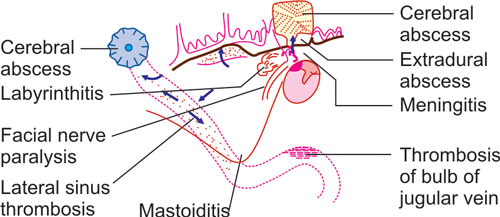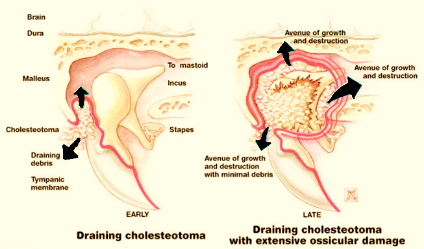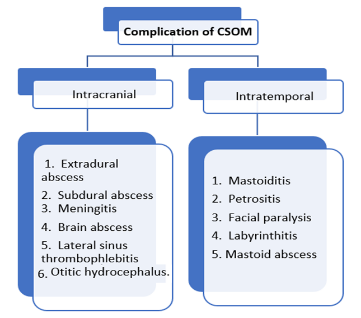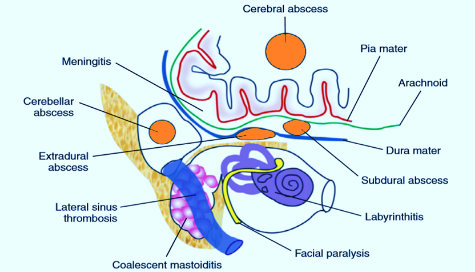
COMPLICATIONS OF CHRONIC SUPPURATIVE OTITIS MEDIA
Complications are usually seen in Active Squamosal type of COM with Cholesteatoma.
Mode of spread of infection:
- Direct extension through the de-mineralized bone seen in cholesteatoma.
- Blood borne spread via the veins, through bone and dura to venous sinuses, more common in acute infections. Lateral sinus thrombophlebitis causes spread of infection to the cerebellum.
- Through round or oval window into the auditory meatus on the vestibular aqueducts.
- Dehiscence of bony covering over the jugular bulb or the tegmen tympani.
- Neoplastic or accidental bone erosion.
- Through surgical defect in post Stapedotomy surgery.

Complications of CSOM:


General symptoms of Intracranial complications are due to:
- Symptoms due to the infection.
- Compression of brain tissue.
- Headache.
- Malaise.
- Fever, drowsiness.
- Neck rigidity with Kernig’s sign positive.
- Hemiplegia with cranial nerve symptoms.
- Routine blood count, X-ray chest, ECG.
- Pure Tone Audiometry- This is useful for a qualitative and quantitative analysis of the patients hearing. It also helps for pre-operative and post-operative assessment of the hearing loss and for medico-legal purposes.
- X-ray mastoid Schuller’s view: To diagnose the extent of the disease and status of the mastoid air cells, sinus plate, dural plate and sinodural angle.
- HRCT temporal bone to know the extent of the disease any Intracranial infections.
- Fundoscopy to rule out papilledema.
- Lumber puncture for CSF examination.
- Systemic antibiotics to control infection.
- Mastoidectomy to remove ear infection and cholesteatoma.
- Neurological opinion to manage the intracranial abscess.
- Systemic antibiotics to control infection.
- Drainage of abscess.
- Mastoidectomy to remove ear infection and cholesteatoma.
We Are Always Ready to Help You.
Book An Appointment

